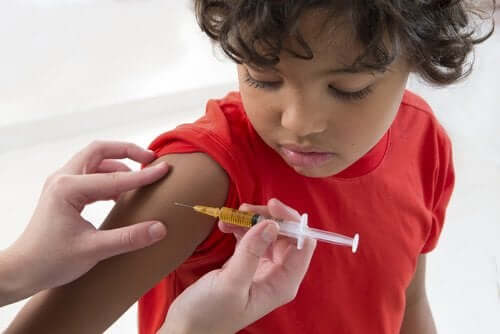Learn More About Meningitis Vaccines for Children

In this article, we’ll tell you everything you need to know about meningitis vaccines for children and adolescents.
Meningitis is a disease that can become very serious, especially certain types of this disease. It most commonly appears during childhood and adolescence, so it’s an issue that can worry a lot of parents.
Fortunately, there are a lot of different vaccines for meningitis. Some of these are on your child’s vaccination schedule, while others are not.
What is meningitis?
Meningitis means inflammation of the meninges – a tissue that lines the nervous system. In other words, they line both the brain and the spinal cord. In addition, meningitis is most common in babies under two years of age.
Also, it can become a very serious disease that causes sequelae and even death in children. That’s why this disease is so alarming for parents.
There are two types of meningitis. First, there’s viral meningitis. As the name suggests, these are caused by viruses. This type of meningitis is milder and the child usually recovers from them without a sequelae. Fortunately, these are also the most common types of meningitis in young children.

On the other hand, the second type is bacterial meningitis. These types are caused by different groups of bacteria. They’re also more serious than the viral types because they can be caused by different types of bacteria. It’s necessary to find the right antibiotic as quickly as possible to help the body fight the infection.
Children are more likely to have sequelae after suffering from this type of meningitis. The groups of bacteria that most frequently cause meningitis are: Haemophilus influenzae type B, Streptococcus pneumonia e or pneumococcus, and Meisseria meningitidis or meningococcus.
Keep reading: 5 Common Childhood Infections During Summer
What symptoms does it cause and how does it spread?
Both types of meningitis are spread through the air and from the secretions of infected people. This, added to the fact that young people are the most vulnerable group, means that extreme precautions need to be taken. In the event of an outbreak in a daycare or school where children have come in contact with the illness, you should treat the environment using prophylactic measures.
Meningitis symptoms can vary. Usually, it causes a very high fever, irritability and crying, especially in younger babies. In addition, your child may experience vomiting, headaches and even drowsiness. Also, a characteristic sign of meningitis is a stiff neck, which doctors will always take seriously in the event the child also has a fever and headache.
Read more: Childhood Vaccines During the Coronavirus Quarantine
Meningitis vaccines for children
We’re going to divide the meningitis vaccines for children into those that are included in the vaccination schedule, and those that are not.
Included vaccines
These vaccines are included in the vaccination schedule:
- Haemophilus Influenzae type B at 2, 4, and 11 months.
- Pneumococcus at 2, 4 and 11 months.
- Meningococcus: there are different types of meningococcus; the most important are sergroups A, B, C, W, X and Y. There are vaccines that protect against several of them. In some places, the vaccination schedule includes the Meningococcus C vaccines at 4 and 12 months of age, with a booster dose at 12 years old.

Vaccinations not included in the schedule
Currently, thanks to the fact that most children are vaccinated against these bacteria, the serogroups that most cause meningitis in our environment are meningococcus B, W and Y.
There’s a vaccine for serogroup B called Bexsero. In addition, there’s a quadrivalent vaccine for serotypes A, C, W and Y (Menveo and Nimenrix). However, although professionals recommend getting these vaccines, they’re not yet included in the vaccination schedule.
Ask your doctor if they would recommend that your children get these vaccines.
As for meningitis vaccines for children, you should know:
Meningitis is a disease that can become very serious, and it especially affects children and adolescents. Therefore, it’s normal for parents to be concerned about this illness. That’s why it’s best to stay up-to-date on your children’s vaccines and their check-ups.
In addition, we recommend having your child get the vaccines that aren’t on the schedule as well. By doing that, you can help prevent your child from suffering from the most serious forms of this disease.
Also, as always, if you notice that your child has any of these symptoms, you should see a doctor as soon as possible. They’ll be able to make the best diagnosis and establish guidelines to follow.
In this article, we’ll tell you everything you need to know about meningitis vaccines for children and adolescents.
Meningitis is a disease that can become very serious, especially certain types of this disease. It most commonly appears during childhood and adolescence, so it’s an issue that can worry a lot of parents.
Fortunately, there are a lot of different vaccines for meningitis. Some of these are on your child’s vaccination schedule, while others are not.
What is meningitis?
Meningitis means inflammation of the meninges – a tissue that lines the nervous system. In other words, they line both the brain and the spinal cord. In addition, meningitis is most common in babies under two years of age.
Also, it can become a very serious disease that causes sequelae and even death in children. That’s why this disease is so alarming for parents.
There are two types of meningitis. First, there’s viral meningitis. As the name suggests, these are caused by viruses. This type of meningitis is milder and the child usually recovers from them without a sequelae. Fortunately, these are also the most common types of meningitis in young children.

On the other hand, the second type is bacterial meningitis. These types are caused by different groups of bacteria. They’re also more serious than the viral types because they can be caused by different types of bacteria. It’s necessary to find the right antibiotic as quickly as possible to help the body fight the infection.
Children are more likely to have sequelae after suffering from this type of meningitis. The groups of bacteria that most frequently cause meningitis are: Haemophilus influenzae type B, Streptococcus pneumonia e or pneumococcus, and Meisseria meningitidis or meningococcus.
Keep reading: 5 Common Childhood Infections During Summer
What symptoms does it cause and how does it spread?
Both types of meningitis are spread through the air and from the secretions of infected people. This, added to the fact that young people are the most vulnerable group, means that extreme precautions need to be taken. In the event of an outbreak in a daycare or school where children have come in contact with the illness, you should treat the environment using prophylactic measures.
Meningitis symptoms can vary. Usually, it causes a very high fever, irritability and crying, especially in younger babies. In addition, your child may experience vomiting, headaches and even drowsiness. Also, a characteristic sign of meningitis is a stiff neck, which doctors will always take seriously in the event the child also has a fever and headache.
Read more: Childhood Vaccines During the Coronavirus Quarantine
Meningitis vaccines for children
We’re going to divide the meningitis vaccines for children into those that are included in the vaccination schedule, and those that are not.
Included vaccines
These vaccines are included in the vaccination schedule:
- Haemophilus Influenzae type B at 2, 4, and 11 months.
- Pneumococcus at 2, 4 and 11 months.
- Meningococcus: there are different types of meningococcus; the most important are sergroups A, B, C, W, X and Y. There are vaccines that protect against several of them. In some places, the vaccination schedule includes the Meningococcus C vaccines at 4 and 12 months of age, with a booster dose at 12 years old.

Vaccinations not included in the schedule
Currently, thanks to the fact that most children are vaccinated against these bacteria, the serogroups that most cause meningitis in our environment are meningococcus B, W and Y.
There’s a vaccine for serogroup B called Bexsero. In addition, there’s a quadrivalent vaccine for serotypes A, C, W and Y (Menveo and Nimenrix). However, although professionals recommend getting these vaccines, they’re not yet included in the vaccination schedule.
Ask your doctor if they would recommend that your children get these vaccines.
As for meningitis vaccines for children, you should know:
Meningitis is a disease that can become very serious, and it especially affects children and adolescents. Therefore, it’s normal for parents to be concerned about this illness. That’s why it’s best to stay up-to-date on your children’s vaccines and their check-ups.
In addition, we recommend having your child get the vaccines that aren’t on the schedule as well. By doing that, you can help prevent your child from suffering from the most serious forms of this disease.
Also, as always, if you notice that your child has any of these symptoms, you should see a doctor as soon as possible. They’ll be able to make the best diagnosis and establish guidelines to follow.
All cited sources were thoroughly reviewed by our team to ensure their quality, reliability, currency, and validity. The bibliography of this article was considered reliable and of academic or scientific accuracy.
- Sáez-Llorens X, McCracken GH. (2003). Bacterial meningitis in children. In: Lancet. Elsevier Limited; 2003. p. 2139–48.
- Calendario de vacunaciones de la Asociación Española de Pediatría: recomendaciones 2020 – ScienceDirect [Internet]. [cited 2020 May 7]. Available from: https://www.sciencedirect.com/science/article/pii/S1695403319303662
- Vacunas contra la Meningitis – Asociación Española Contra la Meningitis [Internet]. [cited 2020 May 7]. Available from: https://www.contralameningitis.org/vacunas-contra-la-meningitis/
This text is provided for informational purposes only and does not replace consultation with a professional. If in doubt, consult your specialist.








